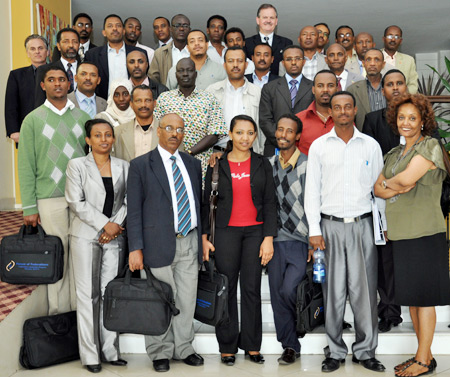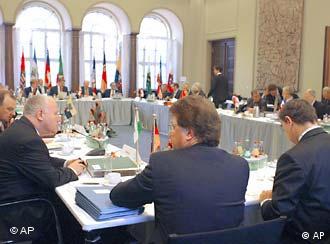Federalism commission (Germany)
Federalism commissions existed in the German history at three occasions:
- The Independent Commission on Federalism existed from 1991 to 1992;
- The Commission of the Bundestag and Bundesrat for the modernization of the federal system from 2003 to 2004;
- On 8 March 2007, the Commission of the Bundestag and Bundesrat to modernize the federal-state financial relations constituted ( Federalism Commission II). (see also: federalism reform)
The tasks differed from each other.
- Contract 3.1
- 3.2 members
Independent Commission on Federalism (1991-1992)
The German Bundestag has requested by decision of 20 June 1991, the parliament's president to appoint a committee of representatives of all constitutional organs of the highest federal and other independent personalities. This Commission has received an order " to develop proposals for the distribution of national and international institutions to the consolidation of federalism in Germany also serve in that particular the new federal states are taken into account with the aim that, in each of the new states federal institutions find their location. Even existing federal institutions in Berlin are up for grabs for it. "
This equal number of members of the Bundestag and rates small committee with 31 members should make suggestions as to which federal agencies should be moved to the new federal states. The chairman was Dr. Bernhard Vogel.
On 27 May 1992 the Commission presented its recommendations - which were to be passed by two-thirds majority, as it was to change the Basic Law. A total of 16 authorities should be moved to the new federal states.
Inter alia
- Federal Labour Court of Kassel to Erfurt;
- Federal Administrative Court of Berlin to Leipzig;
- Federal Environmental Agency from Berlin to Dessau;
- 5 Criminal Division of the Federal and its associated office of the Federal Attorney General to Leipzig.
- Creation of 3 departments of the Federal Insurance Institute for Salaried Employees (now German Federal Pension Insurance ) in the new federal states ( Gera, Stralsund, Brandenburg / Havel )
New federal facilities should be located in the eastern countries.
The Bundestag adopted the Commission's proposals on 26 June 1992 and instructed the Commission to monitor the implementation of the resolutions, to an approximately balanced distribution of federal agencies and institutions is achieved across all countries ( PlenProt 12/100 of 26 June 1992).
Federalism Commission I (2003-2004)
On 16 October 2003, the Bundestag decided to set up a joint commission of the Bundestag and Bundesrat for the modernization of the federal system at the request of the fractions of the SPD, the CDU / CSU, the Alliance 90/The Greens and the FDP ( pressure 15/ 1685). The Commission's objective was to reform the division of responsibilities between federal and state governments. Background is the complicated jurisdiction in the legislation of Germany; this division causes about 60 % of all federal laws require the approval of the Bundesrat. The Federalism Commission should make proposals on how the powers between the federal and state governments can be redistributed to allow political decisions more quickly and efficiently and to structure the political responsibilities at the federal and state levels more clearly.
Order
The Commission should in particular
- The allocation of legislative powers between the federal government and the Länder,
- The responsibilities and rights of participation of countries in the federal legislation and
- The financial relations (in particular joint tasks and mixed financing ) between federal and state
Checked.
Members and representatives
Entitled to vote
The Commission has 32 voting members, each with 16 members of the Bundestag (8 SPD deputy, 6 CDU, 1 Green, 1 FDP) and 16 members of the Federal Council ( prime minister or mayor ).
Chairman of the Commission were Edmund Stoiber, Minister President of the Free State of Bavaria ( CSU and Chairman ), representing the country side, and Franz Müntefering, head of the SPD parliamentary group ( and federal chairman of the SPD ) as a representative of the federation. The decision for the establishment of two equal chairman was done to emphasize the " Gleichgewichtigkeit both banks ."
Not entitled to vote
Advisory members of the federal government were Brigitte Zypries (Ministry of Justice ), Hans Eichel ( Ministry of Finance), Renate Künast ( Ministry of Consumer Protection ), and Frank -Walter Steinmeier (chief of the Federal Chancellery ). Furthermore, the Commission has 6 representatives of the country days and 3 members of the municipal umbrella organizations to, as well as 12 high school teachers as experts.
Course
The inaugural meeting of the committee was on 7 November 2003. Federalism Commission met regularly thereafter and was guided by the meetings of the Federal Council ( to which members from the countries were mostly in Berlin anyway ). Overall, there were 11 meetings. Individual aspects were discussed in two working groups 7 project and.
According to the schedule, that on 17 December 2004, the Commission presents its results. Had it come to the conclusion the Commission that are necessary for the modernization of the federal system changes in the constitution, so they would have had the job to make concrete proposals.
A few weeks prior to that date, members of the commission expressed critical of chances of success, as the necessary constitutional amendment majorities ( 2/3) were not sure; as highly problematic enough, among other things, the field of higher education policy.
On 17 December 2004 it was announced that the talks had failed. The main conflict of the education policy had been established. Specifically, proved to be the formulation of the joint task " educational planning " under Article 91b GG to be incompatible. While the country side insisted on a full competence in the field of education and therefore to a deletion of the phrase, argued the federal representatives that against the background of the basic statutory objective of " equality of living conditions " this participation possibility should be maintained. To some extent, however, also alleged reason for the failure of the "political system itself " would have been. The politicians threw themselves in front of each other to be responsible for the failure. Given the urgency of the reconstruction of federalism everywhere showed dismay. However, a mediation meeting with the President in January 2005 was not successful.
In the coalition talks after the election of 2005, the theme was taken up again. After further rounds of meetings in 2006, federal, state and the coalition parties agreed on a bill to reform federalism. Bundestag and Bundesrat voted the most extensive changes to the constitution to with the necessary two-thirds majority. On 1 September 2006, the body of law has come into force. The reform of state financial constitution was initially excluded and should be resolved only in a further step.
Federalism Commission II (2007-2009)
Have Bundestag and the Bundesrat on 15 December 2006 at the request of the factions of the CDU / CSU, SPD and FDP ( in Drs.16/3885 ) decided ( PlenProt 16/74 ) to set up a joint commission to modernize the federal-state financial relations. The President of the Bundestag and the Bundesrat have constituted the Commission on 8 March 2007. The Commission has completed its work on March 5, 2009 with the submission of proposals for reform. The Act Amending the Basic Law (Article 91c, 91d, 104b, 109, 109a, 115, 143d ) in July 2009 and the accompanying law to the second federal reform 10 August 2009 29 the Commission's proposals were implemented.
Order
In the restructuring of federal-state financial relations is about three topics from the field of financial constitution:
- To adopt Tax issues, in particular the allocation of tax revenues and the competence of the federal laws, the financial consequences of the states and municipalities have to bear: Financial relations between federal and state governments.
- Länderfinanzausgleich: This is about a redistribution volume of 30 billion euros between rich and poor states.
- Method to limit the national debt
Members
The Federalism Commission II had 32 voting members, each with 16 members of the Bundestag (6 SPD deputy, 6 CDU, FDP 2, 1 Green, 1 Left ) and 16 members of the Federal Council ( prime minister or mayor ). Presidents are Dr. Peter Struck for the Bundestag and the Baden-Württemberg Minister President Günther Oettinger, the Federal Council. Furthermore, the Commission consists of four representatives of the diets with the application and the right to speak (but not vote ) and to three representatives of the municipal umbrella organizations.
Overall, the Commission of 36 men and 3 women existed.










